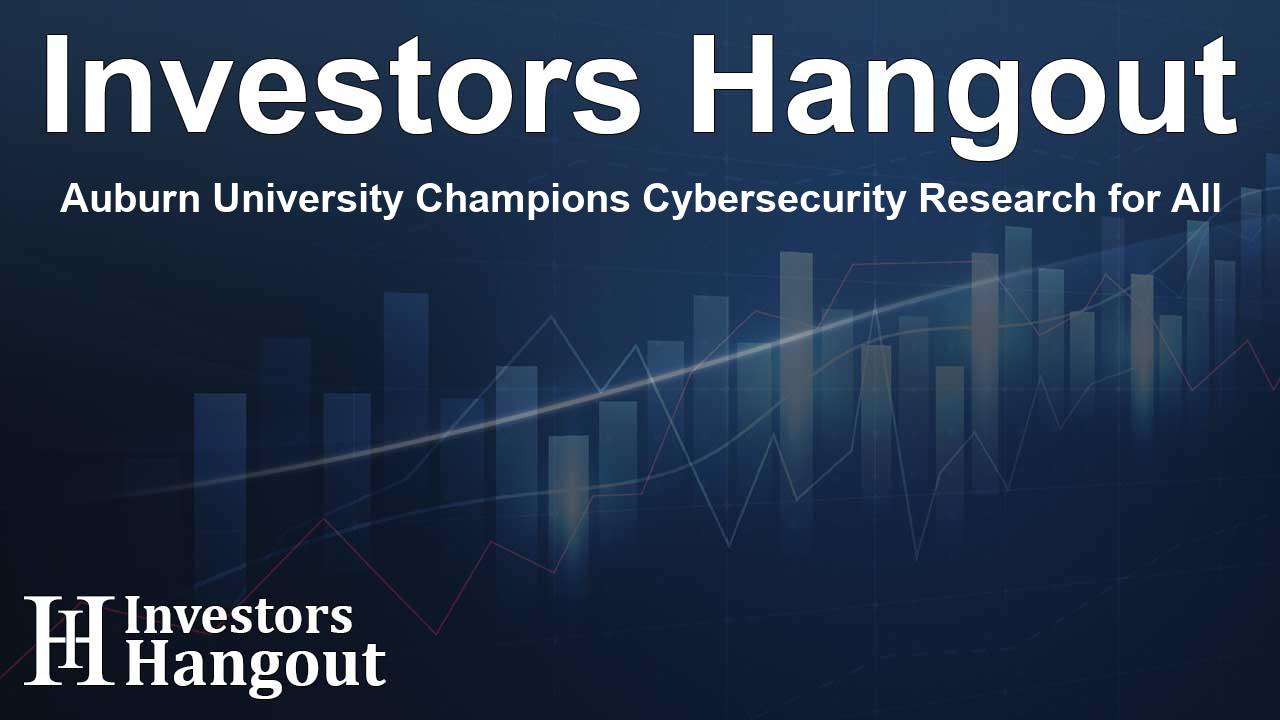Auburn University Champions Cybersecurity Research for All

Auburn University Champions Cybersecurity Research for All
Auburn University researchers tirelessly work to safeguard our daily lives from potential cyber threats. From the technology in our homes to the systems that keep our voting processes secure, their commitment to cybersecurity is unwavering.
Building a Cyber-Educated Workforce
Steve Taylor, Auburn's vice president for research and economic development, emphasizes the importance of developing a cyber-educated workforce. He highlights ongoing efforts to create new degree programs designed to equip students with the necessary skills to address the challenges of the digital age.
Spotlight on the McCrary Institute
At the forefront of Auburn's cyber defense initiatives is the McCrary Institute for Cyber and Critical Infrastructure Security. Since its establishment in 2015, the institute has been instrumental in bridging the gap between theoretical research and practical implementation in cybersecurity. It aims to provide actionable insights for policymakers and enhance national security through comprehensive strategies.
Enhancing National Security through Research
Recently, the McCrary Institute received a significant grant of $10 million aimed at developing real-world solutions for critical infrastructure. This grant will help set up a collaboration center where experts can come together to tackle pressing cybersecurity challenges, particularly in securing the power grid and other essential sectors.
The Importance of GPS Security
As technology continues to evolve, the university's GPS and Vehicle Dynamics Lab plays a crucial role in addressing vulnerabilities within GPS systems. Assistant Professor Scott Martin states that these systems are prone to interference, which can disrupt essential public and private infrastructures. Thus, ongoing research is focused on improving accuracy by incorporating various sensors to make navigation robust against such interferences.
Quantum Engineering and Telecommunication Security
In the realm of telecommunications, quantum engineering emerges as a revolutionary approach to secure communications. While U.S. research strives to catch up with advancements from other nations, the Department of Defense actively supports initiatives to enhance quantum information processing. These projects include developing new methodologies for quantum key distribution, promising a new frontier in secure communications.
Committed to Cybersecurity Education
The Department of Computer Science and Software Engineering, along with the Auburn Cyber Research Center, provides vital training for students. The program received recognition as a National Center of Academic Excellence in Cybersecurity, demonstrating the university's commitment to cultivating a skilled workforce prepared to meet cybersecurity challenges.
Securing Our Elections
Auburn researchers also focus on election security, highlighting the complexities of the U.S. election system. By collaborating with the Department of Political Science, faculty provide valuable training to poll administrators, ensuring they possess the skills necessary to maintain the integrity of elections.
Addressing Food Security Challenges
The intersection of food safety and cybersecurity is evident in the university's collaborative efforts. Former Professor Bob Norton works to enhance food security by addressing vulnerabilities that can arise from cyber-attacks or biological threats. This includes developing a Biological Intelligence, Surveillance, and Reconnaissance system to proactively monitor potential threats to the food supply chain.
Community Engagement and Growth
Auburn University continues to foster partnerships that contribute to rural development through initiatives like the Auburn University Rural Partnership Institute. By leveraging technology in agriculture and forestry, the university aims to improve economic outcomes in rural areas of Alabama while maintaining robust cybersecurity practices.
Frequently Asked Questions
What roles do Auburn University researchers play in cybersecurity?
The researchers are involved in cybersecurity research, developing educational programs, and providing solutions for real-world issues impacting national security.
How is Auburn University addressing the cybersecurity workforce gap?
Auburn University is creating new degree programs aimed at equipping students with skills necessary for careers in cybersecurity.
What is the McCrary Institute's mission?
The McCrary Institute focuses on developing practical cybersecurity strategies while bridging research with real-world applications, enhancing national security.
How does Auburn University contribute to election security?
The university collaborates with political science faculty to provide training for poll administrators, ensuring fair elections through improved operational skills.
What innovative approaches does Auburn use to ensure food security?
Auburn researchers are working to address vulnerabilities in the food supply chain by implementing advanced research systems that monitor potential threats from cyber-attacks and biological hazards.
About Investors Hangout
Investors Hangout is a leading online stock forum for financial discussion and learning, offering a wide range of free tools and resources. It draws in traders of all levels, who exchange market knowledge, investigate trading tactics, and keep an eye on industry developments in real time. Featuring financial articles, stock message boards, quotes, charts, company profiles, and live news updates. Through cooperative learning and a wealth of informational resources, it helps users from novices creating their first portfolios to experts honing their techniques. Join Investors Hangout today: https://investorshangout.com/
Disclaimer: The content of this article is solely for general informational purposes only; it does not represent legal, financial, or investment advice. Investors Hangout does not offer financial advice; the author is not a licensed financial advisor. Consult a qualified advisor before making any financial or investment decisions based on this article. The author's interpretation of publicly available data shapes the opinions presented here; as a result, they should not be taken as advice to purchase, sell, or hold any securities mentioned or any other investments. The author does not guarantee the accuracy, completeness, or timeliness of any material, providing it "as is." Information and market conditions may change; past performance is not indicative of future outcomes. If any of the material offered here is inaccurate, please contact us for corrections.